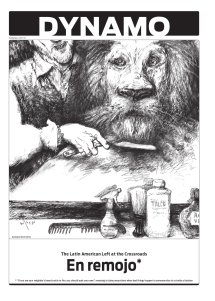Ideas into movement
Boost TNI's work
50 years. Hundreds of social struggles. Countless ideas turned into movement.
Support us as we celebrate our 50th anniversary in 2024.

The Transnational Institute proudly presents the first issue of Dynamo, a monthly and bilingual (English and Spanish) review of current debates and new ideas on international politics and economics. Dynamo is jointly published by TNI, la diaria (a Uruguayan newspaper run by a cooperative of journalists and media workers) and a collective of Latin American scholar-activists.

When la diaria newspaper first came out, Uruguay and several other Latin American countries were starting on a period of “progressive” governments. Today, we tend to call this period “a cycle” because, contrary to the expectations of many, these governments were not here to stay indefinitely. Instead, in recent years, they suffered electoral defeats or are now facing various crises. The conception of history as an inevitable and upward process towards socialism, driven by the development of productive forces and with a single, predetermined subject, does not hold up anymore. But the neoliberal dream of reaching the end of history with globalised capitalism has not proven valid in any way.
To this, one can add a certain level of discontent with the results of these progressive governments’ performance. This is not due to a lack of progress in numerous areas: for instance, poverty and extreme poverty were reduced substantially; economies, employment and real wages grew, and social policies were expanded. It is because in some cases, it would appear that the advances can more easily be reversed than originally believed. Also, they have generally been accompanied by a lack of changes in some crucial domains, whereas in others, there has been a consolidation of policies, institutional criteria or ideological approaches that do not correspond to what one could call progressivism. And it is not merely a reaction to the consequences of the crisis of central capitalism since 2008. There were obviously the limitations of the “progressive” project itself, errors made by the political groups promoting them, the shortcomings of social movements and the lessons the right has learned, among other factors.
At the same time, and probably due to the circumstances mentioned above, we have been noticing a growing thirst for a debate on ideas among la diaria readers. For example, a column published in the last edition of anuaria (la diaria’s end of the year review) sparked a fruitful exchange on economic growth and redistribution, which involved economists, political scientists and political leaders. Before and after this, we had elements that confirmed the importance of promoting these discussions on a wide range of issues, such as university extension policies, the role of the state, feminist demands and the proposal to modify copyright laws, to name a few.
This is where the proposal emerged to launch a monthly supplement dedicated to political reflections on the current times, the ones probably to come and also the ones we want to come (while we accept uncertainty, we do not renounce to choosing a path to follow). It is difficult to assess advances and setbacks without revisiting and redefining our long-term projects: there is still a need to come to terms with the experiences of the 19th and 20th centuries and to study the processes currently underway and reflect on the 21st century.
When the time came to give this initiative a name (which is always complicated), the first proposals revolved around notions of criticism and resistance. Then, we realised that since developing critical thought - in crisis for several decades - was as necessary now as ever and there was a lot to resist, we were not happy with the idea of identifying these pages only with words of complaint, rejection or condemnation. On the contrary, we wanted to emphasise the desire to learn from experience in order to broaden horizons and set projects into motion.
This is not a speech at a wake or the beginning of a period of mourning. It is not merely a painful assessment of the end of a cycle, nor an attempt to simply put the blame on others in order to distance ourselves from the setbacks. We feel we are part of the problem and we want to be part of the solution. This is why we have chosen the name of a generator: we were not thinking about a hydroelectric dam, much less a nuclear plant, but rather a modest dynamo, which is consistent with our desire to travel lightly and be self-sufficient. Perhaps it will help us to find our path, now that it is dark out and we are pedalling uphill.
Colofon: Editor-in-chief: Lucas Silva / Coordination: Marcelo Pereira, Natalia Uval / Graphic designer: Martín Tarallo / Graphic editor: Iván Franco /
Illustrator: Ramiro Alonso / Proo-reader: Karina Puga / Writers: Rodrigo Arim, Gabriel Delacoste, Gustavo Gómez, Gabriel Kaplún, Diego
León Pérez, Aldo Marchesi, Guillermo Mastrini, Daniel Chavez, Mabel Thwaites Rey, Hilary Wainwright / Translator: Karen Lang